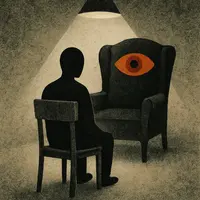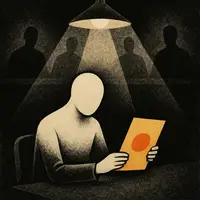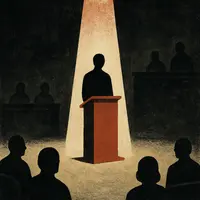The Polygraph : A Pre-Sentencing Character Test
Sentencing is scheduled for Wednesday, March 30. In the meantime, my lawyer has recommended I take a polygraph to prove to the court that I’ve never had sexual contact with a minor.
The polygrapher, a Vietnam veteran and former FBI agent, was friendly and direct. When I took my seat in the small, windowless testing room, he looked me in the eye and asked, “So how did you get mixed up in kiddie porn?”
We talked briefly about my legal troubles and made small talk about our families, the war, and life in general, all in an effort to help me relax.
Before beginning the test, we went over the questions he’d ask. The first three pertained to sexual offenses: Have you ever had sexual contact with a minor? Have you ever solicited sex from a child? Have you ever produced child pornography?
Then he threw in a couple of questions aimed at proving to the court that I’m a person of good character: Have you ever intentionally made a promise you knew you couldn’t keep? Have you ever lied to avoid taking responsibility?
The questions related to sex were straightforward, but the “character” questions made me uneasy. Hasn’t everyone lied to avoid responsibility at some point in their lives? When I was 10 years old, I once pocketed a five-dollar bill a classmate had dropped in the bathroom. Later I lied about ever seeing the money. More childhood misdeeds and fibs resurfaced the longer I considered the question.
So the polygrapher suggested we tweak the question: “As an adult, have you ever lied to avoid taking responsibility?”
The old war vet then hooked me up to some equipment stacked behind my chair. Two coiled wires went around my upper and lower chest. Then two metal clips were fastened to the index and ring fingers of my right hand. My left arm was fitted with a blood pressure cuff, and in the seat of my chair was a pressure pad that detected movement.
The questions were randomized, and the test was performed three times. After each response, the polygrapher paused while the equipment measured my reaction. I tried to relax, as I’d been told, but I grew increasingly aware of my hitched breathing, rapid pulse, and a ticking hollowness in my chest.
When the tests were finally over, the polygrapher said he would score the results using the “least stringent scoring method.” I asked if the scoring method would matter to the judge, and he said that judges neither know the difference nor care to know the difference. For five grueling minutes, he stared at his computer screen, analyzing the results. I kept glancing over at his face, looking for any revealing sign, but he didn’t so much as blink.
How accurate are polygraph tests, anyway?
Finally, the printer behind me spit out a piece of paper. The polygrapher held it carefully in his hands, looked it over from top to bottom, and declared, “No deception detected.”



